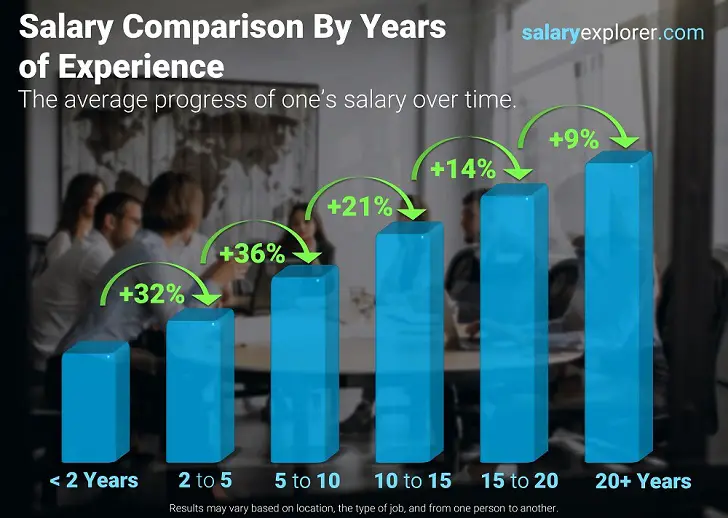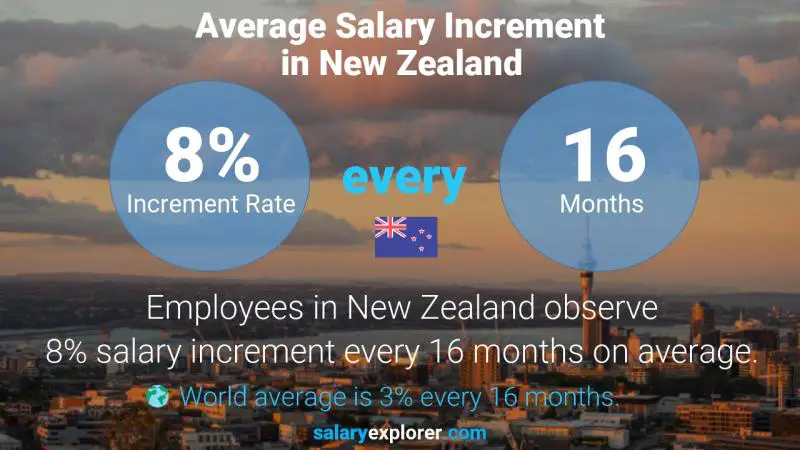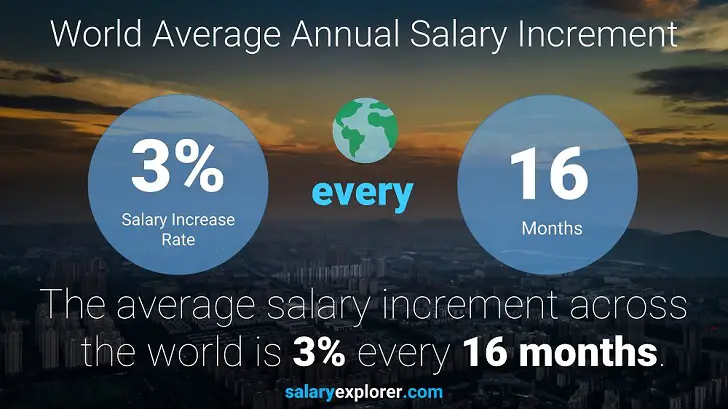Bookkeeper Average Salary in New Zealand 2024
How much money does a person working as Bookkeeper make in New Zealand?

LOW
24,600
NZD AVERAGE
46,400
NZD HIGH
70,600
NZD
A person working as Bookkeeper in New Zealand typically earns around 46,400 NZD. Salaries range from 24,600 NZD (lowest) to 70,600 NZD (highest).
Salary Variance
This is the average salary including housing, transport, and other benefits. Bookkeeper salaries in New Zealand vary drastically based on experience, skills, gender, or location. Below you will find a detailed breakdown based on many different criteria.
Bookkeeper Pay Scale and Salaries in New Zealand

Salary Structure and Pay Scale Comparison
41,700 NZD or more
37,200 to 41,700 NZD
27,400 NZD or less
27,400 to 37,200 NZD
 24,600 NZD |
 41,900 NZD |
 70,600 NZD |
Median Salary, maximum and minimum salary, minimum wage, starting salary, and the salary range
Salary Range, Minimum Wage, and Starting Salary
Salaries for the position Bookkeeper in New Zealand range from 24,600 NZD (starting salary) to 70,600 NZD (maximum salary). It should be noted that the given figure is not the legally mandated minimum wage; rather, it represents the lowest figure reported in a salary survey that included thousands of participants and professionals from all regions of the country.
Median Salary
With a median salary of 41,900 NZD, half of the professionals who work as Bookkeeper in New Zealand earn less than this amount, and the other half earn more. The median salary denotes the middle value of salaries. Ideally, you would want to belong to the group earning more than the median salary, located on the right side of the salary distribution graph.
Percentiles and Salary Scale
The median is closely associated with two other values known as the 25th and 75th percentiles. By examining the salary distribution chart, it can be determined that 25% of professionals employed as Bookkeeper in New Zealand earn less than 34,900 NZD, while 75% earn more. Similarly, the chart shows that 75% earn less than 47,400 NZD while 25% earn more.
Pay Scale Structure
To provide a better understanding of expected salaries, we categorized the frequently occurring salaries into different ranges. This approach provides a more precise representation of salary distribution for the job title Bookkeeper in New Zealand compared to simply calculating the average. The majority of reported salaries, approximately 65%, fall within the range of 27,400 NZD to 37,200 NZD. About 20% of salaries are below the 27,400 NZD mark, while 10% fall within the range of 37,200 NZD to 41,700 NZD. Only 5% of individuals have salaries exceeding 41,700 NZD.
Salary Comparison by Years of Experience / Bookkeeper / New Zealand
How do experience and age affect pay?
| 0 - 2 Years | 28,300 NZD | |
| 2 - 5 Years | +23% | 34,700 NZD |
| 5 - 10 Years | +42% | 49,200 NZD |
| 10 - 15 Years | +17% | 57,500 NZD |
| 15 - 20 Years | +10% | 63,200 NZD |
| 20+ Years | +6% | 66,900 NZD |

The experience level is the most important factor in determining the salary. Naturally, the more years of experience the higher the wage. We broke down salaries by experience level for people working as Bookkeeper and this is what we found.
Employees with less than two years of experience earn approximately 28,300 NZD.
While someone with an experience level between two and five years is expected to earn 34,700 NZD, 23% more than someone with less than two year's experience.
Moving forward, an experience level between five and ten years lands a salary of 49,200 NZD, 42% more than someone with two to five years of experience.
Additionally, professionals whose expertise span anywhere between ten and fifteen years get a salary equivalent to 57,500 NZD, 17% more than someone with five to ten years of experience.
If the experience level is between fifteen and twenty years, then the expected wage is 63,200 NZD, 10% more than someone with ten to fifteen years of experience.
Lastly, employees with more than twenty years of professional experience get a salary of 66,900 NZD, 6% more than people with fifteen to twenty years of experience.
Typical Salary Progress for Most Careers

Salary Comparison By Education / Bookkeeper / New Zealand
How do education levels affect salaries?
Displayed below is the average salary variance between different education levels of professionals working as Bookkeeper.
| High School | 34,700 NZD | |
| Certificate or Diploma | +40% | 48,500 NZD |
| Bachelor's Degree | +42% | 68,700 NZD |

We all know that higher education equals a bigger salary, but how much more money can a degree add to your income? We broke down salaries by education level for the position Bookkeeper in order to make a comparison.
Level 1: High School
Employees at this education level have an average salary of 34,700 NZD.
Level 2: Certificate or Diploma
At this level, the average salary becomes 48,500 NZD, 40% more than the previous level.
Level 3: Bachelor's Degree
At this level, the average salary becomes 68,700 NZD, 42% more than the previous level.
Typical Salary Difference by Education for Most Careers

Salary and Compensation Comparison By Gender / Bookkeeper / New Zealand

Though gender should not have an effect on pay, in reality, it does. So who gets paid more: men or women? For the people who work as Bookkeeper in New Zealand, the average difference between the salary of male and female employees is 5%.
| Male | 47,500 NZD | |
| Female | -5% | 45,200 NZD |
Salary Comparison By Gender in New Zealand for all Careers

Average Annual Salary Increment Percentage / Bookkeeper / New Zealand
How much are annual salary increments in New Zealand for individuals working as Bookkeeper? How often do employees get salary raises?
Individuals working as Bookkeeper in New Zealand are likely to observe a salary increase of approximately 10% every 15 months. The national average annual increment for all professions combined is 8% granted to employees every 16 months.

New Zealand / All Professions

The term Annual Salary Increase usually refers to the increase in 12 calendar month period, but because it is rare that people get their salaries reviewed exactly on the one-year mark, it is more meaningful to know the frequency and the rate at the time of the increase.
How to calculate the salary increment percentage?
The annual salary Increase in a calendar year (12 months) can be easily calculated as follows: Annual Salary Increase = Increase Rate x 12 / Increase Frequency
Worldwide Salary Raises: All Countries and All Jobs

Salary Packages and Schemes
Not all compensation increases are reflected directly in the salary. Some companies offer upgraded packages to their staff instead of cash money. The figures displayed here account only for direct increments to the base salary.
Bonus and Incentive Rates / Bookkeeper / New Zealand
How much and how often are bonuses being awarded? Share This Chart Tweet Get Chart Linkhttp://www.salaryexplorer.com/charts/new-zealand/accounting-and-finance/bookkeeper/annual-salary-bonus-rate-new-zealand-bookkeeper.jpg
Share This Chart Tweet Get Chart Linkhttp://www.salaryexplorer.com/charts/new-zealand/accounting-and-finance/bookkeeper/annual-salary-bonus-rate-new-zealand-bookkeeper.jpg
73% of surveyed staff reported that they haven't received any bonuses or incentives in the previous year while 27% said that they received at least one form of monetary bonus.
Those who got bonuses reported rates ranging from 1% to 3% of their annual salary.
| Received Bonus | 27% | |
| No Bonus | 73% |
Types of Bonuses Considered
Individual Performance-Based BonusesThe most standard form of bonus, where the employee is awarded based on their exceptional performance.
Company Performance BonusesOccasionally, some companies like to celebrate excess earnings and profits with their staff collectively in the form of bonuses that are granted to everyone. The amount of the bonus will probably be different from person to person depending on their role within the organization.
Goal-Based BonusesGranted upon achieving an important goal or milestone.
Holiday / End of Year BonusesThese types of bonuses are given without a reason and usually resemble an appreciation token.
Bonuses Are Not Commissions!
People tend to confuse bonuses with commissions. A commission is a prefixed rate at which someone gets paid for items sold or deals completed while a bonus is in most cases arbitrary and unplanned.
What makes a position worthy of good bonuses and a high salary?
The main two types of jobs | |
| Revenue Generators | Supporting Cast |
Employees that are directly involved in generating revenue or profit for the organization. Their field of expertise usually matches the type of business. | Employees that support and facilitate the work of revenue generators. Their expertise is usually different from that of the core business operations. |
Example: | Example: |
Revenue generators usually get more and higher bonuses, higher salaries, and more frequent salary increments. The reason is quite simple: it is easier to quantify your value to the company in monetary terms when you participate in revenue generation.
Bonus Comparison by Seniority Level
Top management personnel and senior employees naturally exhibit higher bonus rates and frequencies than juniors. This is very predictable due to the inherent responsibilities of being higher in the hierarchy. People in top positions can easily get double or triple bonus rates than employees down the pyramid.
Average Hourly Wage / Bookkeeper / New Zealand
 22 NZD per hour
22 NZD per hourThe average hourly wage (pay per hour) for individuals working as Bookkeeper in New Zealand is 22 NZD.This is the rate they get paid for every worked hour.
About The Hourly Pay Rate
The hourly wage is the salary paid in one worked hour. Usually, jobs are classified into two categories: salaried jobs and hourly jobs. Salaried jobs pay a fixed amount regardless of the hours worked. Hourly jobs pay per worked hour. To convert salary into hourly wage the above formula is used (assuming 5 working days in a week and 8 working hours per day which is the standard for most jobs). The hourly wage calculation may differ slightly depending on the worked hours per week and the annual vacation allowance. The figures mentioned above are good approximations and are considered to be the standard. One major difference between salaried employees and hourly paid employees is overtime eligibility. Salaried employees are usually exempt from overtime as opposed to hourly paid staff.
What is the minimum hourly rate of pay?
The minimum pay rate per hour for people working as Bookkeeper in New Zealand is 12 NZD. This is the minimum as per the gathered data in the salary survey not the minimum hourly rate mandated by law.
Salary comparison with similar jobs
| Job Title | Average Salary |
| Accounting and Finance |  -100% -100% | |
| Account Examiner | 50,900 NZD |  +10% +10% |
| Account Executive | 89,400 NZD |  +93% +93% |
| Accountant | 68,900 NZD |  +48% +48% |
| Accounting Analyst | 86,400 NZD |  +86% +86% |
| Accounting Assistant | 51,600 NZD |  +11% +11% |
| Accounting Associate | 48,000 NZD |  +3% +3% |
| Accounting Clerk | 41,000 NZD |  -12% -12% |
| Accounting Coordinator | 61,100 NZD |  +32% +32% |
| Accounting Head | 142,000 NZD |  +210% +210% |
| Accounting Manager | 145,000 NZD |  +210% +210% |
| Accounting Officer | 49,900 NZD |  +7% +7% |
| Accounting Specialist | 96,300 NZD |  +110% +110% |
| Accounting Supervisor | 92,700 NZD |  +100% +100% |
| Accounting Technician | 46,600 NZD |  +0% +0% |
| Accounting Unit Controller | 113,000 NZD |  +140% +140% |
| Accounts Executive | 82,500 NZD |  +78% +78% |
| Accounts Officer | 53,300 NZD |  +15% +15% |
| Accounts Payable and Receivable Specialist | 69,100 NZD |  +49% +49% |
| Accounts Payable Assistant | 54,700 NZD |  +18% +18% |
| Accounts Payable Associate | 64,100 NZD |  +38% +38% |
| Accounts Payable Clerk | 48,400 NZD |  +4% +4% |
| Accounts Payable Manager | 136,000 NZD |  +190% +190% |
| Accounts Receivable Administrator | 98,900 NZD |  +110% +110% |
| Accounts Receivable Clerk | 48,900 NZD |  +5% +5% |
| Accounts Receivable Financial Analyst | 96,500 NZD |  +110% +110% |
| Accounts Receivable Manager | 135,000 NZD |  +190% +190% |
| Accounts Receivable Team Leader | 101,000 NZD |  +120% +120% |
| Algorithmic Trading Specialist | 120,000 NZD |  +160% +160% |
| Assistant Accountant | 50,000 NZD |  +8% +8% |
| Assistant Accounting Manager | 122,000 NZD |  +160% +160% |
| Assistant Auditor | 70,400 NZD |  +52% +52% |
| Assistant Corporate Controller | 91,700 NZD |  +98% +98% |
| Assistant Finance Manager | 143,000 NZD |  +210% +210% |
| Assistant Financial Controller | 95,800 NZD |  +110% +110% |
| Audit Director | 155,000 NZD |  +230% +230% |
| Audit Supervisor | 124,000 NZD |  +170% +170% |
| Auditing Clerk | 53,300 NZD |  +15% +15% |
| Auditing Manager | 144,000 NZD |  +210% +210% |
| Billing Clerk | 51,600 NZD |  +11% +11% |
| Billing Coordinator | 58,800 NZD |  +27% +27% |
| Billing Specialist | 70,900 NZD |  +53% +53% |
| Billing Supervisor | 102,000 NZD |  +120% +120% |
| Bookkeeper | 46,400 NZD |  -0% -0% |
| Bookkeeping Specialist | 63,500 NZD |  +37% +37% |
| Budget Analyst | 116,000 NZD |  +150% +150% |
| Budget Manager | 133,000 NZD |  +190% +190% |
| Business Support Analyst | 79,400 NZD |  +71% +71% |
| Capital Markets Associate | 98,100 NZD |  +110% +110% |
| Cash Flow Analyst | 103,000 NZD |  +120% +120% |
| Cash Management Manager | 129,000 NZD |  +180% +180% |
| Cash Management Officer | 78,900 NZD |  +70% +70% |
| Cashbook Clerk | 47,500 NZD |  +2% +2% |
| Chartered Accountant | 83,800 NZD |  +80% +80% |
| Chief Accountant | 103,000 NZD |  +120% +120% |
| Chief Financial Technology Officer | 141,000 NZD |  +200% +200% |
| Collections Clerk | 42,200 NZD |  -9% -9% |
| Collections Representative | 58,200 NZD |  +25% +25% |
| Collections Specialist | 72,200 NZD |  +56% +56% |
| Corporate Controller | 105,000 NZD |  +130% +130% |
| Corporate Treasurer | 135,000 NZD |  +190% +190% |
| Cost Accountant | 65,000 NZD |  +40% +40% |
| Cost Accounting Manager | 135,000 NZD |  +190% +190% |
| Cost Accounting Supervisor | 107,000 NZD |  +130% +130% |
| Cost Analyst | 103,000 NZD |  +120% +120% |
| Credit and Collection Manager | 129,000 NZD |  +180% +180% |
| Credit and Collection Staff | 50,300 NZD |  +8% +8% |
| Credit and Loans Officer | 49,500 NZD |  +7% +7% |
| Credit Controller | 95,000 NZD |  +100% +100% |
| Credit Manager | 136,000 NZD |  +190% +190% |
| Debt Adviser | 110,000 NZD |  +140% +140% |
| Debt Collector | 56,600 NZD |  +22% +22% |
| Debtors Clerk | 46,600 NZD |  +0% +0% |
| Debtors Controller | 49,900 NZD |  +7% +7% |
| Deputy CFO | 178,000 NZD |  +280% +280% |
| Deputy Head of Finance | 180,000 NZD |  +290% +290% |
| Derivative Trader | 115,000 NZD |  +150% +150% |
| Director of Finance | 193,000 NZD |  +320% +320% |
| E-commerce Accountant | 72,000 NZD |  +55% +55% |
| Economist | 151,000 NZD |  +230% +230% |
| Equity Analyst | 124,000 NZD |  +170% +170% |
| Escrow Assistant | 61,700 NZD |  +33% +33% |
| Executive Accountant | 77,100 NZD |  +66% +66% |
| External Auditor | 92,700 NZD |  +100% +100% |
| Finance Administrator | 81,600 NZD |  +76% +76% |
| Finance Analyst | 125,000 NZD |  +170% +170% |
| Finance Associate | 58,200 NZD |  +25% +25% |
| Finance Data Analyst | 112,000 NZD |  +140% +140% |
| Finance Director | 208,000 NZD |  +350% +350% |
| Finance Executive | 140,000 NZD |  +200% +200% |
| Finance Licensing Clerk | 47,000 NZD |  +1% +1% |
| Finance Licensing Manager | 132,000 NZD |  +180% +180% |
| Finance Licensing Specialist | 71,200 NZD |  +53% +53% |
| Finance Manager | 189,000 NZD |  +310% +310% |
| Finance Officer | 65,800 NZD |  +42% +42% |
| Finance President | 193,000 NZD |  +320% +320% |
| Finance Relationship Manager | 158,000 NZD |  +240% +240% |
| Finance Release Analyst | 80,900 NZD |  +74% +74% |
| Finance Specialist | 107,000 NZD |  +130% +130% |
| Finance Team Leader | 153,000 NZD |  +230% +230% |
| Financial Accountant | 67,000 NZD |  +44% +44% |
| Financial Actuary | 101,000 NZD |  +120% +120% |
| Financial Administrator | 107,000 NZD |  +130% +130% |
| Financial Advisor | 124,000 NZD |  +170% +170% |
| Financial Analyst | 118,000 NZD |  +150% +150% |
| Financial Applications Specialist | 88,800 NZD |  +91% +91% |
| Financial Assistant | 54,700 NZD |  +18% +18% |
| Financial Associate | 62,200 NZD |  +34% +34% |
| Financial Claims Analyst | 93,700 NZD |  +100% +100% |
| Financial Claims Manager | 119,000 NZD |  +160% +160% |
| Financial Claims Supervisor | 116,000 NZD |  +150% +150% |
| Financial Clerk | 53,700 NZD |  +16% +16% |
| Financial Commercial Analyst | 102,000 NZD |  +120% +120% |
| Financial Compliance Analyst | 109,000 NZD |  +130% +130% |
| Financial Compliance Officer | 105,000 NZD |  +130% +130% |
| Financial Consultant | 88,000 NZD |  +90% +90% |
| Financial Controller | 103,000 NZD |  +120% +120% |
| Financial Coordinator | 59,400 NZD |  +28% +28% |
| Financial Customer Service Manager | 126,000 NZD |  +170% +170% |
| Financial Data Scientist | 130,000 NZD |  +180% +180% |
| Financial Dealer and Broker | 74,200 NZD |  +60% +60% |
| Financial Director | 200,000 NZD |  +330% +330% |
| Financial Encoder | 57,000 NZD |  +23% +23% |
| Financial Manager | 181,000 NZD |  +290% +290% |
| Financial Modelling Analyst | 120,000 NZD |  +160% +160% |
| Financial Operations Manager | 171,000 NZD |  +270% +270% |
| Financial Policy Analyst | 110,000 NZD |  +140% +140% |
| Financial Project Manager | 140,000 NZD |  +200% +200% |
| Financial Quantitative Analyst | 115,000 NZD |  +150% +150% |
| Financial Reporting Consultant | 102,000 NZD |  +120% +120% |
| Financial Reporting Manager | 135,000 NZD |  +190% +190% |
| Financial Section Head | 126,000 NZD |  +170% +170% |
| Financial Services Manager | 171,000 NZD |  +270% +270% |
| Financial Services Sales Agent | 74,900 NZD |  +61% +61% |
| Financial Technology Consultant | 111,000 NZD |  +140% +140% |
| Financial Wellness Coach | 138,000 NZD |  +200% +200% |
| FinTech Analyst | 111,000 NZD |  +140% +140% |
| Fixed Assets Administrator | 69,900 NZD |  +51% +51% |
| Forensic Accountant | 79,600 NZD |  +71% +71% |
| Fraud Detection Supervisor | 81,400 NZD |  +75% +75% |
| Fraud Prevention Manager | 142,000 NZD |  +210% +210% |
| Fund Accountant | 63,800 NZD |  +37% +37% |
| Grants Coordinator | 49,400 NZD |  +6% +6% |
| Green Finance Analyst | 98,300 NZD |  +110% +110% |
| Group Financial Manager | 188,000 NZD |  +300% +300% |
| Internal Auditor | 93,400 NZD |  +100% +100% |
| Internal Control Adviser | 104,000 NZD |  +120% +120% |
| Internal Control Officer | 60,800 NZD |  +31% +31% |
| International Tax Director | 156,000 NZD |  +240% +240% |
| Inventory Accountant | 71,600 NZD |  +54% +54% |
| Investment Advisor | 189,000 NZD |  +310% +310% |
| Investment Analyst | 133,000 NZD |  +190% +190% |
| Investment Associate | 110,000 NZD |  +140% +140% |
| Investment Broker | 108,000 NZD |  +130% +130% |
| Investment Fund Manager | 155,000 NZD |  +230% +230% |
| Investment Operations Manager | 152,000 NZD |  +230% +230% |
| Investment Underwriter | 56,400 NZD |  +21% +21% |
| Investor | 91,800 NZD |  +98% +98% |
| Investor Relations Manager | 137,000 NZD |  +200% +200% |
| KYC Team Leader | 130,000 NZD |  +180% +180% |
| Loan Processor | 53,400 NZD |  +15% +15% |
| Management Accountant | 74,800 NZD |  +61% +61% |
| Management Economist | 158,000 NZD |  +240% +240% |
| Paymaster | 56,900 NZD |  +23% +23% |
| Payroll Administrator | 91,500 NZD |  +97% +97% |
| Payroll Benefits Coordinator | 75,300 NZD |  +62% +62% |
| Payroll Billing Manager | 119,000 NZD |  +160% +160% |
| Payroll Clerk | 57,900 NZD |  +25% +25% |
| Payroll Manager | 128,000 NZD |  +180% +180% |
| Payroll Officer | 59,900 NZD |  +29% +29% |
| Payroll Specialist | 68,400 NZD |  +47% +47% |
| Payroll Supervisor | 85,500 NZD |  +84% +84% |
| Pensions Administrator | 72,000 NZD |  +55% +55% |
| Personal Financial Advisor | 96,800 NZD |  +110% +110% |
| Pricing Analyst | 116,000 NZD |  +150% +150% |
| Private Equity Analyst | 116,000 NZD |  +150% +150% |
| Project Accountant | 71,600 NZD |  +54% +54% |
| Proposal Development Coordinator | 60,500 NZD |  +30% +30% |
| Quantitative Trader | 94,300 NZD |  +100% +100% |
| Receivables Accountant | 60,100 NZD |  +29% +29% |
| Regulatory Accountant | 71,600 NZD |  +54% +54% |
| Retirement Plan Analyst | 105,000 NZD |  +130% +130% |
| Revenue Management Specialist | 116,000 NZD |  +150% +150% |
| Revenue Recognition Analyst | 127,000 NZD |  +170% +170% |
| Risk Management Director | 164,000 NZD |  +250% +250% |
| Risk Management Supervisor | 129,000 NZD |  +180% +180% |
| Staff Accountant | 62,900 NZD |  +35% +35% |
| Tax Accountant | 63,100 NZD |  +36% +36% |
| Tax Administrator | 74,500 NZD |  +60% +60% |
| Tax Advisor | 101,000 NZD |  +120% +120% |
| Tax Analyst | 106,000 NZD |  +130% +130% |
| Tax Associate | 59,900 NZD |  +29% +29% |
| Tax Consultant | 106,000 NZD |  +130% +130% |
| Tax Director | 162,000 NZD |  +250% +250% |
| Tax Examiner | 74,200 NZD |  +60% +60% |
| Tax Manager | 141,000 NZD |  +200% +200% |
| Tax Research Manager | 135,000 NZD |  +190% +190% |
| Teller | 41,500 NZD |  -11% -11% |
| Treasury Accountant | 70,800 NZD |  +52% +52% |
| Treasury Analyst | 115,000 NZD |  +150% +150% |
| Underwriter | 47,500 NZD |  +2% +2% |
| Underwriting Assistant | 42,600 NZD |  -8% -8% |
| Vice President of Finance | 181,000 NZD |  +290% +290% |
Government vs Private Sector Salary Comparison
Where can you get paid more, working in a private company or the government? The difference between the public or government sector salaries and the private sector salaries in New Zealand is 5% on average across all career fields.
| Private Sector | 94,900 NZD | |
| Public Sector | +5% | 99,900 NZD |
Salary Statistics and Calculation Guide
What is considered to be a good and competitive salary for the job title Bookkeeper in New Zealand?
A good and competitive compensation would range anywhere between 41,900 NZD and 47,400 NZD. This is a very rough estimate. Experience and education play a very huge part in the final earnings.
Gross Salary (before tax) and Net Salary (after tax)
All salary and compensation figures displayed here are gross salary figures, that is the salary before tax deductions. Because taxes may differ across sectors and locations, it is difficult to accurately calculate the net salary after tax for every career.
Base / Basic Salary
The base salary for a careers like Bookkeeper in New Zealand ranges from 24,600 NZD to 34,900 NZD. The base salary depends on many factors including experience and education. It is not easy to provide a figure with very little information, so take this range with a grain of salt.
What is the difference between the median and the average salary?
Both are indicators. If your salary is higher than both the average and the median then you are doing very well. If your salary is lower than both, then many people earn more than you and there is plenty of room for improvement. If your wage is between the average and the median, then things can be a bit complicated. We wrote a guide to explain all about the different scenarios. How to compare your salary




